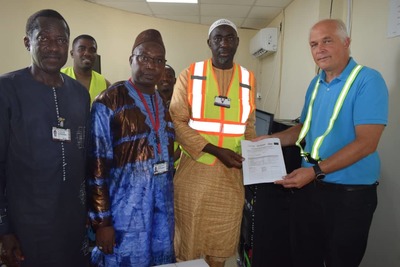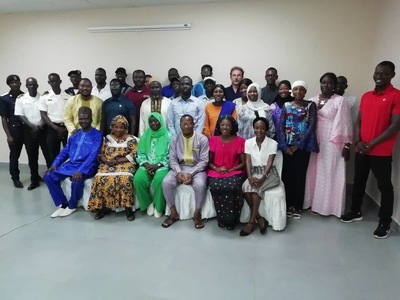Fisheries Officers Trained on Digital Data Collection

The Department of Fisheries in collaboration with the Sub-Regional Fisheries Commission (SRFC) and the French National Research Institute for Sustainable Development (IRD) on Thursday 17th February 2022, commenced a two-day training workshop on data collection for the Fisheries Information System.
Anna Mbenga Cham, Director of Fisheries in her opening statement, expressed sincere gratitude to the participants and as well their partners for their commitment to the sustainable management, conservation, and development of the Fisheries Resources.
She further reaffirmed the Department’s commitment through The Ministry of Fisheries to the development of the Fisheries sector since the sector plays a crucial role in the economic and social development of the nation.
Dr. Patrice Brehmer, IRD, gave a brief background of the IRD, stating that it is a French institution and promotes research for development in different sectors including the fisheries sector.
“The workshop is a continuation of what we have done in the first phase, that is the harmonization of data collection at the sub-regional level and to deploy a digital data collection system in order to facilitate the work on the landing site,” he said.
He added that they are currently focusing on small pelagic fish with the objective to extend to all other geographic species.
According to Dr. Patrice, they are trying to promote sub-regional collaboration inside this project, and in this second phase, they want to extend the use of android tablets in other to collect some important data.
For this purpose, he revealed that they would deploy some seawater temperature sensors which can communicate with the tablet and the information can be sent directly to the Fisheries department.
“We will also try to set an observatory for mammals on the beach and also all the seaweed events as well as try to report other observations like in case of marine pollution, accidents or an unusual interference at sea,” he added
The objective according to him is to show the ability of the Fisheries Department and its data collectors to act as the eyes and the ears of The Gambia along the coast.
He further elaborated on the importance of environmental parameters which he indicated as very important if one wants to manage well the fish stock.
“If you only get the information from the landing site about the catch and all the socio-economic information but miss the information on the water temperature, sea salinity, wind, etc., it will directly impact the fish stock dynamic because all these factors impact the dynamic of productivity of the ecosystem,” he stressed.


